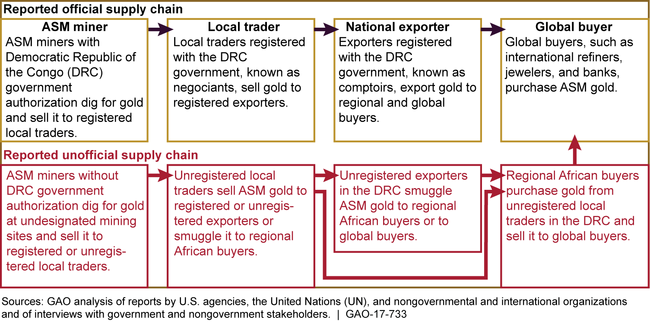The GAO has issued a new report on conflict minerals focused in this instance on the supply chain for artisanal and small-scale mined (ASM) gold in the DRC region. The report also addressed efforts to encourage responsible sourcing of ASM gold and sexual violence in the region since the GAO’s last report in August 2016.
According to this report, gold is a significant driver of the DRC’s economy. There are reportedly more than 1,000 ASM gold mine sites in the DRC, typically employing groups of 30 to 300 miners. The way the gold mining process is supposed to work is that the supply chain participants are required to obtain DRC government authorization, such as official mining cards, or register with the provincial or national government to trade or export ASM gold in or from the DRC. They are also required to pay provincial or national taxes to mine, trade or export ASM gold. In reality, however, “almost all DRC-sourced ASM gold is produced and traded unofficially and smuggled from the country…. Further, elements of the Congolese army as well as illegal armed groups, frequently exploit ASM gold, often through illegal taxes on its production and transport, according to reports and stakeholders.” Some of the factors cited in the report that facilitate smuggling include “limited government control over the remote areas where ASM gold is primarily produced, inadequate infrastructure, and corruption,” as well as weak border enforcement.
Below is the GAO’s graphic illustrating the disparity between the official and actual supply chains:

The report observes that, while progress has been made recently “in reducing the presence of armed groups at tantalum, tin, and tungsten mine sites,…the widespread availability of gold in remote, difficult-to-access areas of the eastern DRC and the lack of a functioning traceability system allow armed groups to operate at gold mine sites with minimal government and international oversight.”
While the DRC and the USAID, as well various international organizations, have commenced initiatives to encourage the responsible sourcing of ASM gold, there are still few mines validated as conflict free, and, the GAO concluded, there are few incentives for responsible sourcing.
In the meantime, a USAID-funded study of the rate of sexual violence in 2016 in “parts of the eastern DRC estimated that 32 percent of women and 33 percent of men in these areas had been exposed to some form of sexual and gender-based violence in their lifetime. According to the United Nations, the DRC government has taken some steps to address sexual violence in the eastern region.”

You must be logged in to post a comment.